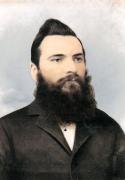|
|
||||||||||||||||||||||||
 |
Featured person
Recently added |
Fergus Pyle (1935 - 1997): |
||||||||||||||||||||||
Fergus Pyle was one of the most distinguished journalists on the staff of The Irish Times, the Dublin broadsheet, where he served for 36 years (with one brief break). This included two periods as Northern Editor (that is, covering Northern Ireland), as well as serving a period as Editor, and in other senior posts at home and abroad.
Fergus Patrick d'Esterre Pyle was born in Dublin, son of William Pyle, a prominent academic in the English department of Dublin University, specialising in Elizabethan literature, and a member of the Royal Irish Academy. Fergus Pyle was educated at Aravon School, Bray, and at Campbell College Belfast, a distinguished school in the east of the city. He graduated from Dublin University in classical and modern languages, studied at Freiburg University in Germany and was an intern at the United Nations in New York. After a brief period working for Aer Lingus, he was appointed to the staff of The Irish Times as a junior leader writer, although he had no formal journalistic training; it was said that an interview he conducted with Conor Cruise O'Brien, the Irish UN diplomat involved in the Katanga/Congo crisis suitably impressed the newspaper.
In 1967 he was sent to Belfast by the then Editor, Douglas Gageby, himself from Belfast though, an Irish nationalist, he had settled in Dublin. A later Editor, Conor Brady, wrote of Pyle's reporting from Belfast that he "brought unprecedented depth to the reporting of Northern Ireland. His insight into its politics was acute. His reporting, whether from the streets or from Stormont [the Northern Ireland Parliament], was superb." His four years in Belfast were momentous years in Northern Ireland, covering the civil rights campaigns, the beginning of violence in the Troubles, and significant developments which served to end the decades-long political and social conditions and ushered in bleak times which would pertain until late in the century. It was quipped that his reports of proceedings at Stormont were so detailed that they were longer than the official Parliamentary record.
In 1971 he was appointed Paris correspondent, and in 1973 on Ireland's accession to the EEC, Brussels correspondent. In 1974 he became Editor in succession to Gageby. His performance in this post drew a lot of criticism, though this was not universal, and some of the paper's troubles were due to external factors not in Pyle's control; for instance, the economic upheaval of the oil crisis. However, even his supporters were critical of editorial decisions such as reducing the type-size; per contra, his introduction of a separate Weekend section was considered a success. Quite possibly his biggest challenge as Editor was how the paper dealt with allegations of abusive interrogation of suspects by the Garda Síochána (the Republic of Ireland's police force). The Irish Times' research was painstakingly thorough and documented in detail, and Pyle took the decision early in 1977 to publish the journalistic findings. This broke investigative journalistic ground in Ireland, though Pyle was heavily criticised in some quarters for undermining the Garda Síochána.
Later in 1977, after sustaining a lot of internal criticism, he resigned (and was succeeded by Gageby) to take up a post at Dublin University. However, in 1981 he was back at the paper and in 1987, again Northern Editor; for a while authoring the paper's weekly column "Northern Notebook", which under the highly influential Gageby's ultimate editorial line, could tend to be partisan to the nationalists, while less than sympathetic to unionism (the column was demoted from the Saturday edition to the Monday, and eventually vanished altogether). In March 1990 the multilingual Pyle was posted to Germany, from where he reported on more momentous events. After German unification he returned to Dublin and became chief leader writer and assistant editor at The Irish Times. In 1997 he took ill and, still on the paper's staff, died aged just 62.
Editor Emeritus of The Irish Times, Conor Brady, said of Pyle, that although he had weaknesses and made mistakes, nevertheless was "one of the brilliant stars of his generation", adding that his achievements in the adverse conditions he had to face were "not inconsiderable". He enabled The Irish Times to consolidate itself as "the authoritative chronicler of Ireland's new relationship with Europe" and he "sustained first-class coverage of Northern Ireland - in particular during the ghastly period that followed the fall of the power-sharing Executive."
Pyle, who was married to Mary Burrowes, daughter of the leading Irish actress Rachel Burrowes, produced a special supplement for The Irish Times in 1966 to commemorate the Easter Rising of 1916; this was published in 1968 as a book, 1916: the Easter Rising, co-authored with the historian Owen Dudley Edwards.
| Born: | 17 March 1935 |
| Died: | 11 April 1997 |
| Richard Froggatt |
| Acknowledgements: Wesley McCann |
| Bibliography: Dictionary of Irish Biography; http://politico.ie/archive/media/720-defending-fergus-pyle (article by Conor Brady) |


Home | Our Policies | Plaques | Browse | Search | Sponsors | Links | Help | Contact
Privacy & Disclaimer | Cookie Policy | Site Map | Website Design By K-Point
© 2024 Ulster History Circle









